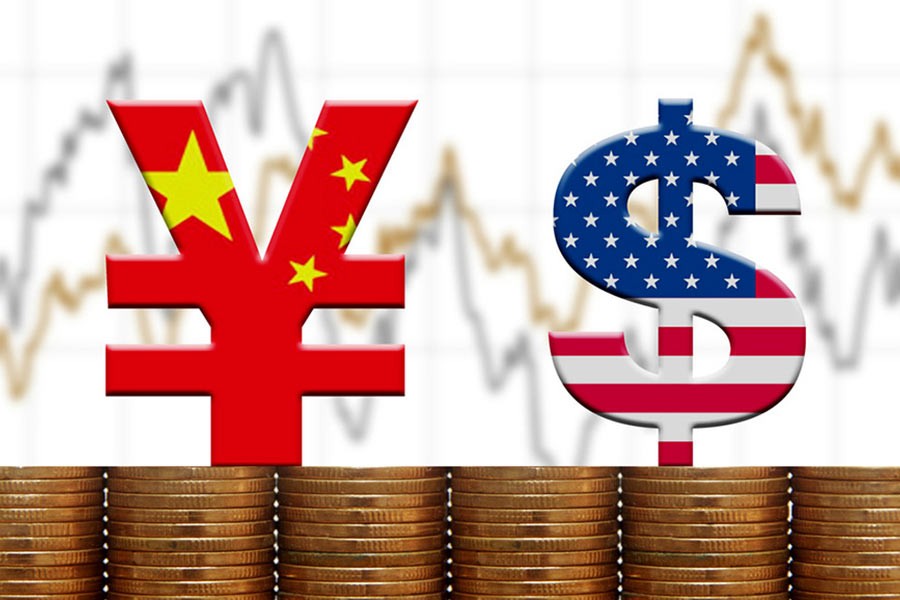
Published :
Updated :

The on-going US-China trade tension-no less than a raging trade war-is yet to leave any visible impact on global trading patterns. However, it is clear that in the long run the impact is not going to remain confined to the two warring countries alone and would have its ramifications in various forms and shades if the current trade sanctions in the form of higher tariffs by the USA on Chinese imports persist to become a long-lasting reality. Since July, US President Donald Trump has imposed punitive tariffs on $250 billion worth of annual Chinese imports to put pressure on Beijing to change key elements of its industrial policy. Chinese leaders have responded with new tariffs on $60 billion worth of US exports.
There are quarters -- research organisations to be precise -- which are at work trying to make sense of the probable upshot -- perhaps in the form of trade diversion in favour of other countries. Here in Bangladesh, like elsewhere in the developing world, speculations are on whether the country is going to gain from the current trade tension between the two largest economies of the world.
According to an assessment of the central bank published last week, Bangladesh may have a short-term 'comparative advantage' in both its exports and imports. In its quarterly report, the central bank mentioned that the potential gain will depend on addressing infrastructural and financial issues. The report said chances of Bangladesh's prospect in increasing its share in global trade will largely depend on how the country addresses the issues such as infrastructural changes, competition from other countries, financing readiness, skilled labour shortage and depreciation of the Chinese currency. About 7.0 per cent of the country's total current exports are found identical to those of China that faced US tariff, the report says. China's 6,831 export products worth US$ 250 billion are now under US tariff. Of these, 75 Bangladesh products are of the same HS code, which is valued at $ 2.27 billion. Also, the report said some 33 per cent of the country's total import items are identical to Chinese exports under US Tariff, which is 37 per cent in the case of similar products.
A cautious observer will find that these pieces of information do not lead to any clear understanding about how trade in reality will behave. In this context, it may be kept in mind that China has continued its effort to retain its share in international market through depreciation of its currency against the US Dollar. This, in other words, poses the question whether Bangladesh in a bid to gain competitive advantage should also depreciate its currency. So, there are tricky factors that at the moment make it a difficult guess in so far as Bangladesh is concerned.
As against Bangladesh, the perspective is quite different in some South Asian countries. Vietnam, for example, is widely believed to successfully cash in on the prevailing situation. Vietnamese companies are emerging as key winners of the trade war between the US and China, according to a new survey of companies from the two countries. Both American and Chinese companies participating in the survey, published last week by the Guangzhou-based American Chamber of Commerce in South China, said that as a result of the trade conflict, they have been losing market share, especially to companies from Vietnam. Chinese companies also reported of losing sales to companies from India, the US and South Korea. With the prospect of more tariffs looming, most survey participants said that they were looking at shifting production, assembly or sourcing of supplies to third countries, with Southeast Asia as the leading choice. It is here that besides gaining increased market share, Vietnam stands out as a good source for imports as well as a destination for relocation of businesses. Needles to say, massive improvement in infrastructure, trading practices and easing out of financial matters are the main reasons that place Vietnam ahead of many formidable rivals not only in this part of the world but in the developing world at large.
Coming to Bangladesh, it is a stark reality that doing business here, despite government policies that at times look proactive, is still far from satisfactory. Thus while relocation is a far cry, potential trading opportunities, especially in exporting, are also not well set to access overseas markets up to the desired level. Hence, targeting to take a portion of the market share of China in respect of identical products is fraught with many problems. Moreover, unless the export base is expanded and diversified for both existing and new markets, cutting a Chinese share would at its best amount to trade diversion only.
The prevailing US-China trade tension must not be taken as a lasting phenomenon. What we should concentrate upon are the basics - infrastructure, quality assurance, technology and expanded product base in order to stay sustainable, and indeed competitive.


 For all latest news, follow The Financial Express Google News channel.
For all latest news, follow The Financial Express Google News channel.